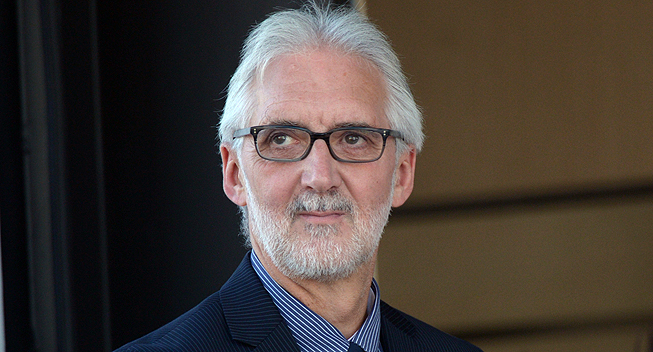UCI President Brian Cookson insists that his big reforms set for 2017 are still on track to come into place in time despite a breakdown during the recent Road World Championships in Ponferrada and in the summer with key stakeholders.
Cyclingnews beieves that Cookson wants to have his reforms approved this winter so they can be put in practice by 2017. The reforms have been created to make cycling more attractive to sponsors and more sustainable for races and organisers.
The riders union is against the reduction of the number of riders on WorldTour teams as this would leave more riders without a contract. Vuelta director Javier Guillen doesn’t like the idea of his Grand Tour being shortened and the AIGCP, the teams association, isn’t keen on the reforms either.
Despite nothing being agreed, Cookson is adamant that he will have his reforms finalised in the coming months so that thy can be enforced in 2017. This means that points earned in the WorldTour in 2015 and 2016 could be influential in deciding who is in the WorldTour in 2017.
“Sometimes you reach a stage where proposals have to be looked at and changed, debated and discussed. We're still in that formative stage. I think it is important that everyone buys into what we come up with at the end of the day and has ownership of it, because some changes will be required,” Cookson told Cyclingnews recently, refusing to go into detail.
“I don't want to comment on any one issue. There's a lot of debate and discussion on a lot of issues, not least on the number of days in a Grand Tour and others. It's right and proper that any of the stakeholders express their opinions and were still in that phase.”
“I also don't want to give any specific day as a key date because then you guys in the media will be knocking on the door asking what happened. I'm not going to be a hostage to fortune in that way,” he said.
“We're still discussing a number of things. At the end of the day it's important we create a system and structure that is comprehensible to everybody, that the fans and the media can understand and that allows the teams, race organisers, sponsors and national federations to be able to have a strong economic structure for the future.”
Details of the reforms have never been publicly released but leaks have allowed the public to see how dramatic these reforms could be for cycling.
The race calendar has been changed, with no two races on at the same time, something that happens with Paris-Nice/Tirreno-Adriatico, Dauphine/Suisse and Vuelta/Most post-Tour one-day races. The Vuelta may be cut and some races may be removed form the WorldTour.
There will also be changes in the size of the teams. The most recent proposal suggested 16 "A" WorldTour teams of 22 riders, with a second division of eight "B" teams and a system of promotion and relegation in place. The eight "B" teams would be like the current Professional Continental teams that fight for Wild Card invitations to the major races. They would be guaranteed 50 days of racing in the new WorldTour system. All 24 teams would have to run a development team but not a women's team.
A salary cap could also be part of the reform to create more financial equality between the teams. Some teams, backed by wealthy individuals or state-controlled sponsors seem to have virtually unlimited budgets, while others are limited by commercial returns of sponsors and short-term contracts.
Some reforms are more common sense than radical, with rider safety reforms helping to deal with incidents like bad weather, as a universal precedent will be set so there is no longer the confusion suffered during the Giro’s snowy Stelvio stage in 2014.
Riders may also race less but face their rivals more often, something like Oleg Tinkov’s proposed Grand Tour Challenge, just a bit more achievable.
The UCI has shown no intention in communicating with fans over their opinions of the reforms and Cookson, who does listen to fans on Twitter, does not want them involved in the decision making process.
“I don't think we can ever not pick up the opinions of the fans and the public. We pick them all the time via the media, the internet and things like Twitter. People certainly let me know what they think via social media,” Cookson told Cyclingnews.
“At the end of the day, the UCI is a representational body and is owned by the federations. Perhaps it's a little archaic in the way its democratic structure operates but if you're a member of a national federation, you have a voice. I urge people to join their national federations around the world rather than send angry tweets.
“We have the final word because we are the international governing body for the sport. We're trying to bring everyone together in a way that works for everyone and gives everyone a sustainable future.”
| Martin VOLTR 23 years | today |
| Jae-Ha LEE 28 years | today |
| Johanna MARTINI 20 years | today |
| Guido TRENTI 52 years | today |
| Richard RISKA 19 years | today |
© CyclingQuotes.com









